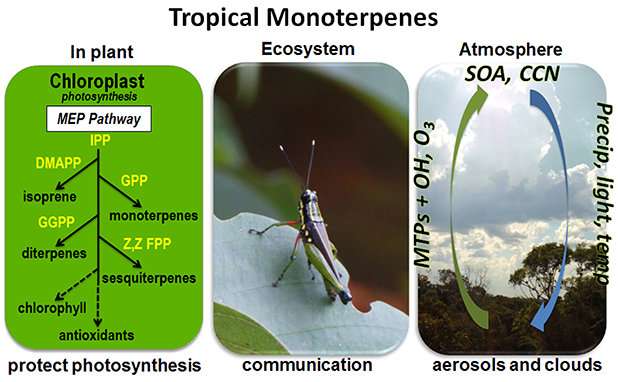Monoterpene measures how certain forests respond to heat stress

In the tropics, forests consume large amounts of carbon dioxide through photosynthesis. Elevated temperatures suppress carbon dioxide absorption while promoting plants to emit the chemical monoterpene. Scientists found that the chemical can be used to take the forest's temperature. Why? A monoterpene "thermometer" changes in response to heat but not time or space.
A monoterpene "thermometer" may be a new tool in studies of warming impacts on the tropics and beyond. Specifically, it may offer insights into tropical biosphere-atmosphere carbon-cycle feedbacks. This work also offers opportunities to develop a "thermometer" gene in agricultural plants. The gene could act as a sensor of stress during droughts and other extremes.
Tropical forests are increasingly threatened by increased temperatures that can lead to oxidative stress, but the physiological mechanisms plants use to cope with these conditions remain poorly understood. In this study, scientists report the discovery of a tropical forest monoterpene "thermometer." The composition of monoterpene emissions changes as a function of temperature. The team found a high temperature sensitivity of the composition of tropical leaf monoterpene emissions across a wide range of temporal (minutes to seasons) and spatial (leaf to ecosystem) scales. As monoterpene emissions increased with temperature, the composition shifted. Highly reactive monoterpenes accounted for a larger fraction of the total under high temperature stress.
This result suggests a biological function of these highly reactive monoterpenes in the tropics. Given their high reactivity to both atmospheric and biological oxidants, the results suggest that monoterpenes play important roles in the thermotolerance of photosynthesis by functioning as effective antioxidants within plants and as efficient atmospheric precursors of secondary organic aerosols, thereby enhancing surface cooling and water recycling. Thus, monoterpene composition may represent a new sensitive "thermometer" of leaf oxidative stress and atmospheric reactivity. Therefore, monoterpene may be a new tool in future studies of warming impacts on tropical biosphere-atmosphere carbon-cycle feedbacks.
More information: Kolby J. Jardine et al. Monoterpene 'thermometer' of tropical forest-atmosphere response to climate warming, Plant, Cell & Environment (2016). DOI: 10.1111/pce.12879
Provided by US Department of Energy

















